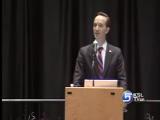24
05
 In 2004, I spent a considerable amount of time lobbying in favor of municipal fiber, known as UTOPIA. Part of my effort was in front of the Salt Lake City council, including a speech that is archived here.
In 2004, I spent a considerable amount of time lobbying in favor of municipal fiber, known as UTOPIA. Part of my effort was in front of the Salt Lake City council, including a speech that is archived here.
Imagine my surprise this morning when I find that Councilman Dave Buhler, on Comcast’s dime, has been testifying in front of officials in Nashville, telling a story that completely contradicts my testimony from 2004.
So I submitted the following to the Nashville City Paper:
It’s nice to know that Dave Buhler, a councilman from my city of Salt Lake is able to find work moonlighting for Comcast in Nashville. I only wish he would have listened closer to my testimony on municipal fiber in his other job.
In fact, businesses and individuals in Salt Lake City did and continue to demand municipal fiber. As founder and president of Utah’s first Internet Service Provider, XMission, I hear this from them continually. The current options of Qwest DSL and Comcast cable do not have anywhere near 100% coverage after nearly a decade of deployment and broken promises. Even more baffling about Mr. Buhler’s statements is that my business is across the street from city offices and we’ve repeatedly “clamored” for better data infrastructure because it is what our customers are not able to get.
Last, the assertion that dial-up meets everyones’ needs is simply flat out wrong. XMission’s dial-up subscribers have plummeted over the past five years along with our customer base due to the fact that we are only allowed to serve their broadband needs on Qwest DSL. Where Qwest does not deploy DSL, the customer will use Comcast and reluctantly stop using our service because they demand broadband facilities. Mr. Buhler’s vision of dial-up is more suited for 1995.
Councilman Buhler, the free market for broadband is failing Salt Lake City and it’s failing America. Countries like South Korea and Sweden recognize the economic force that is fiber-based infrastructure. Their government involvement has knocked the USA to 16th on broadband deployment worldwide. We need leadership and representation that not only has vision for the future, but also listens to what their constituents are saying right now.
 The Deseret News has a light piece on
The Deseret News has a light piece on  The Utah Democratic Convention on May 13th was an exhilarating experience. It was humbling to receive such a warm response to my nomination speech and listen to so many people expressing their support. For those of you who were unable to attend the convention, I have put up
The Utah Democratic Convention on May 13th was an exhilarating experience. It was humbling to receive such a warm response to my nomination speech and listen to so many people expressing their support. For those of you who were unable to attend the convention, I have put up  My long history with Qwest and US West before them has given me a mixed relationship with the company. I love them for having the foresight to share their DSL network with smaller entities instead of taking the monopolistic approach that Comcast has. I dislike them for some of the anti-competitive antics they have displayed over the past thirteen years.
My long history with Qwest and US West before them has given me a mixed relationship with the company. I love them for having the foresight to share their DSL network with smaller entities instead of taking the monopolistic approach that Comcast has. I dislike them for some of the anti-competitive antics they have displayed over the past thirteen years. My campaign is about democracy, drawing off the expertise of those who are most familiar and most affected by specific policies. When it comes to my own expertise, I’m well versed in the history and technical issues of the Internet, because it has been my business for 13 years and I’ve used it for 19.
My campaign is about democracy, drawing off the expertise of those who are most familiar and most affected by specific policies. When it comes to my own expertise, I’m well versed in the history and technical issues of the Internet, because it has been my business for 13 years and I’ve used it for 19.